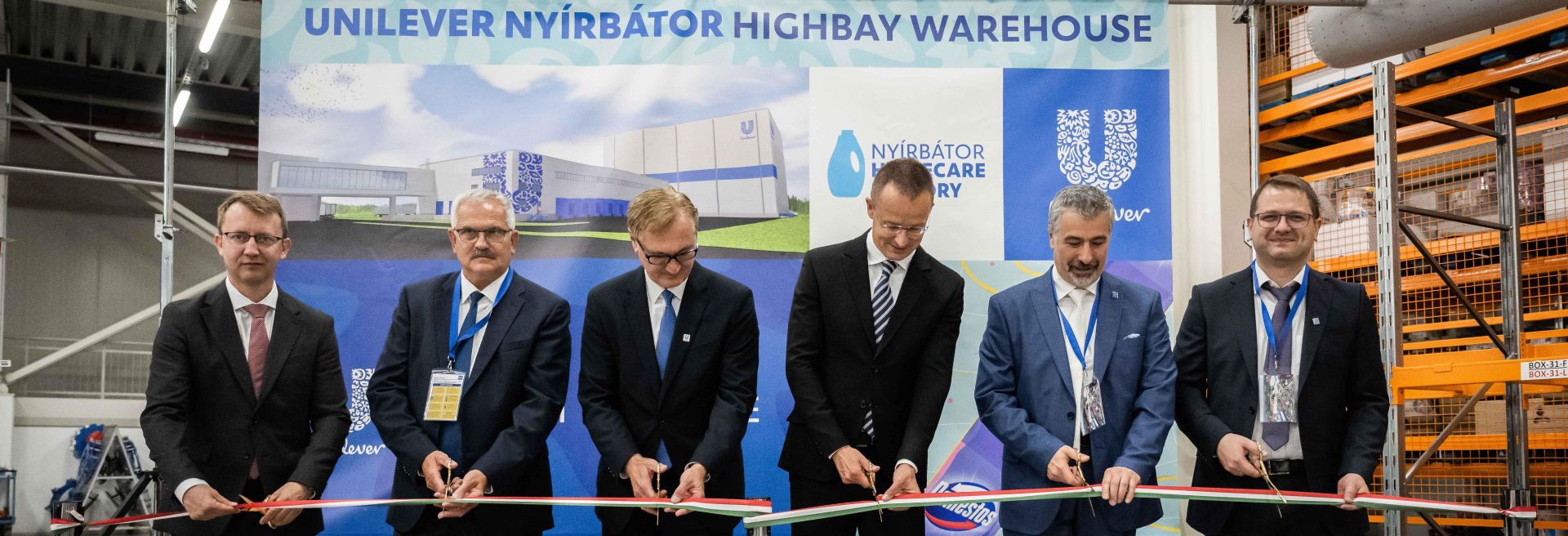
Unilever’s Completed Two-Phase Development Paves Way To Meet Rising Demand For Years To Come
2023. 06. 30.
The inauguration of a fully automated high bay warehouse with increased co-pack capacity marked the completion of Unilever’s two-phase investment in a total amount of EUR 60 million in Nyírbátor, Szabolcs-Szatmár-Bereg county. Thanks to the capacity extension potential output can soar by some 70%.
For over 30 years, Hungary has been a very important manufacturing hub for Unilever in Europe in terms of products such as ice cream and disinfectants. Apart from having two operational factories, Unilever Hungary Kft. also plays a regional management role as it is the center of management processes in Hungary, Slovenia, Croatia and Bosnia, and as such it is responsible for supplying a total of about 20 million consumers.
Ever since Unilever set up shop in the country, it has invested more than EUR 200 million in Hungary and plans to invest another EUR 100 million. Its latest two-phase investment worth EUR 60 million aimed at major capacity and site extension that has now come to completion in Nyírbátor, Szabolcs-Szatmár-Bereg county, some 260 km east from Budapest. As a result, a new loading building and a fully automated high bay warehouse of 8,000 square meters have been set up.

The warehouse resulted in a storage expansion of nearly 14,000 pallet spaces, on-site made products are sorted in automated fashion, and there is also an in-house solution for low volume order consolidation. Truck fill is maximized by using the latest AI technology, whereas temporary storage space is available to cover weekend traffic ban.

Due to substantial capacity extension, now up to 370 million bottles per year can be filled with different homecare products − an extra 70 million pieces compared to the previously available capacity. However, the investment allows to further increase capacity and even build new production units within the existing premises. Thus, potential output could go from 300 million tons to 500 million tons a year.
Over the past decade, the facility in Nyírbátor has grown into a strategic factory thanks to cost-effective production using state-of-the-art technology, Industry 4.0 solutions and an ideal location to supply Eastern European markets. It now has bright perspectives to enhance this importance even more.
Related articles
Sector articles
The Hungarian Investment Promotion Agency (HIPA) achieved outstanding results in 2024, with investment capital inflow into the Hungarian economy exceeding the EUR 10 billion mark for the second year in a row. HIPA CEO Mr. István Joó highlighted that the results ...
2025. 01. 16.
HIPA #HIPALeading investment platform AIM Congress gathered renowned FDI stakeholders from all over the globe in Abu Dhabi yet again where HIPA was presented the AIM Investment Award for the Central, Eastern Europe & Turkey Region.
2024. 05. 27.
HIPA #HIPAAmerican companies form the fourth largest investor community in our country, and economic relations stand the test of time. Hungary does everything to ensure that US businesses would continue to bring FDI here, stressed HIPA CEO Mr. István Joó at AmCham Hungary...
2024. 05. 13.
HIPA #HIPA